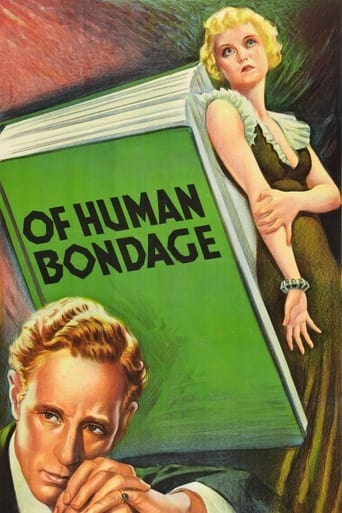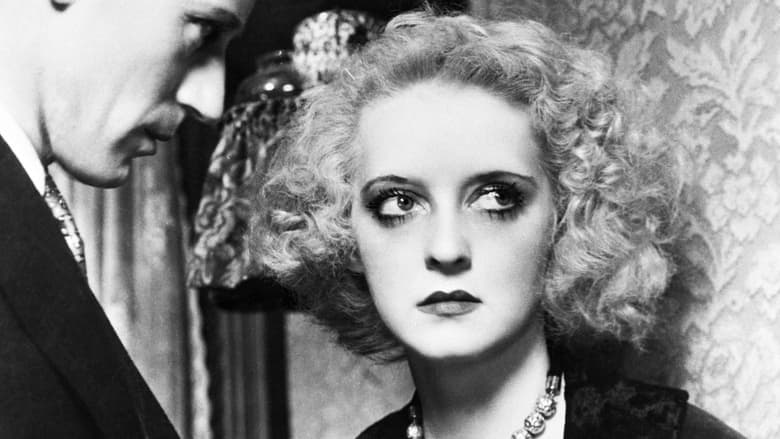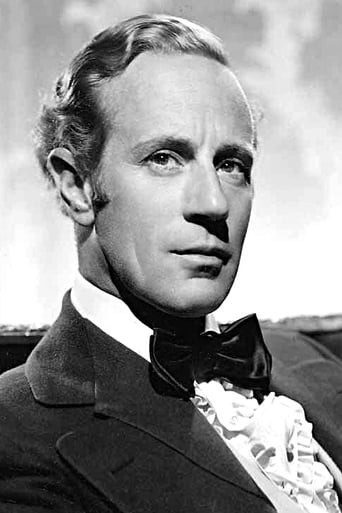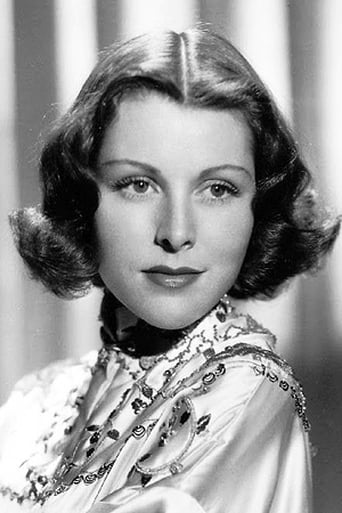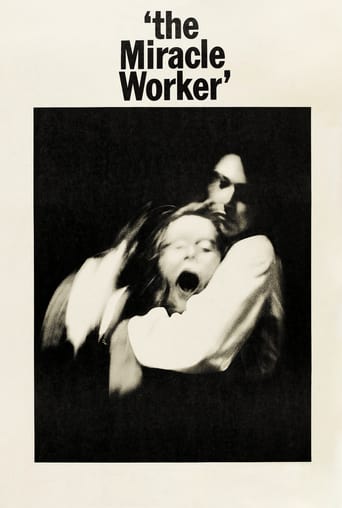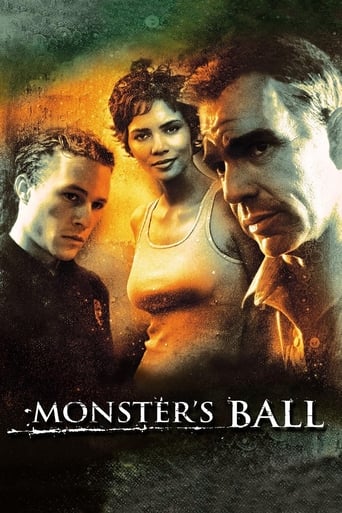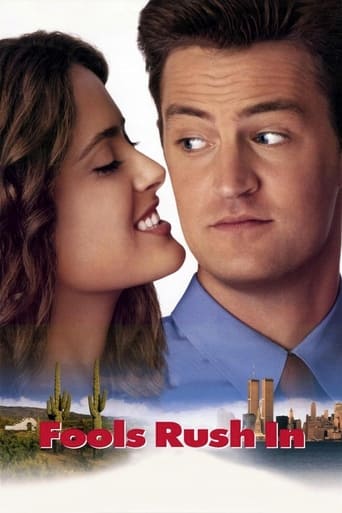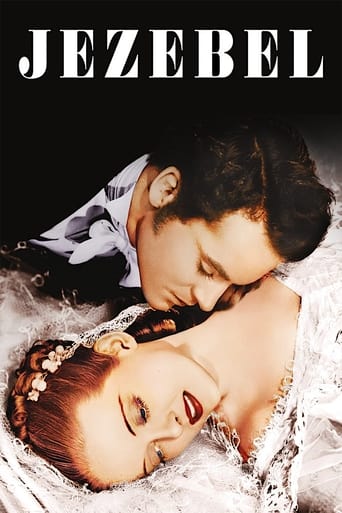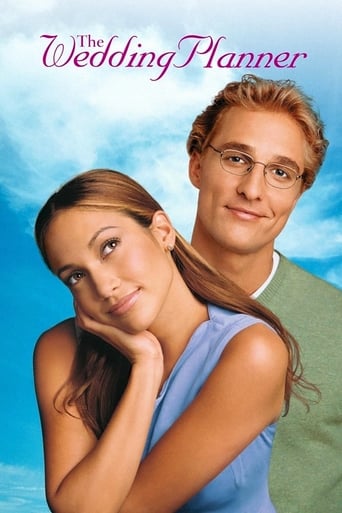Of Human Bondage (1934)
A young man finds himself attracted to a cold and unfeeling waitress who may ultimately destroy them both.
Watch Trailer
Free Trial Channels
Cast


Similar titles
Reviews
Good films always raise compelling questions, whether the format is fiction or documentary fact.
A movie that not only functions as a solid scarefest but a razor-sharp satire.
It's easily one of the freshest, sharpest and most enjoyable films of this year.
Story: It's very simple but honestly that is fine.
This movie is as fascinating as it is timeless. The movie itself motivated me to buy and read W. Somerset Maugham's novel from beginning to end.Both this 1934 original and the 1946 remake with Eleanor Parker are treasures, and while the remake was essentially a reproduction of the earlier version, that makes it no less intriguing for me.While this original (and the 1946 remake) primarily encapsulate Philip's eventful and traumatic encounter with Mildred Rogers, this episode only comprises about 40 percent of the pages of Maugham's 1915 masterpiece. The episode, however, effects Philip to the very end.The screenplay was adopted from the book with some modifications for a happier ending, while being very faithful to the essence of Maugham's dynamic characters, taking many of Mildred's cockney'd lines ("I don't mind") verbatim. In the movie versions Philip's clubfoot is healed through surgery, but in Maugham's novel he seems to bear the handicap to the end, although an operation to correct it was attempted without apparent success.You can't leave this movie (or the book) unchanged, and I am grateful to have experienced it. As for Mildred, we have in life met her, all of us. And perhaps - in one way or another - we are all Philip.
Paris in the 1920s. Leslie Howard is a striving young artist with a club foot who discovers he has no particular talent so he retreats to London and Medical School at St. Bartholomew's. (Nota bene: Living without a job in Paris, then deciding on medical school in London, with no visible means of support, and he just claimed to have "only a little" money.) Right off the bat, we can recognize this as a reckless fantasy from Somerset Maugham. Maugham was a decent writer who was considered middle brow and never credited with anything resembling a master work.In London he meets tarty Bette Davis, an uncultivated waitress, and, his mind distracted by her, he has evidently forgotten the difference between the male and female pelvises he used to joke about, he fails his finals in medical school. (When is this guy going to have to get a job?) She's brushed him off rudely. "Good-bye to bad rubbish." But he broods and dreams of their being together, in love, sipping champagne in fancy night clubs and cooing to each other. (But he'll have to find work first, won't he?) He does manage to work his way into Davis's good graces again -- him and his tuxedo -- but she's as flirty and sharp tongued as ever. He buys her a wedding ring but she tells him she's going to marry a German baron and walks off. Poor Leslie Howard. His love life and his mood have their ups and downs.Well, yes, good riddance to bad rubbish, the pragmatic viewer thinks, but as Howard's next amour, Norah, a settled and sensible authoress puts it, "It's almost as if you were bound to her." Howard's reply, that everybody is bound to something or someone in life, is a non sequitur. We're talking Bette Davis here in one of her bitchiest roles. Yet, when she returns to him, tearful and pregnant, even confessing to the lie that she was married, he sloughs off Norah and takes in the exploitative ex waitress, living on the fruits of love we must imagine.So Davis has her baby, stares at it in the hospital bed, and remarks, "Funny looking little thing, isn't it. I can hardly believe it's mine." And this is presumably just after delivery, during the 24-hour-or-so launch window during which an irrevocable bond forms between mother and infant. It could have been worse, I suppose. She could have said, "It looks just like my German baron." In any case, she promptly farms the kid out to a nursery.Life with Howard's nickum is no bowl of cherries, I assure you. He lavishes gifts on her (where did the money come from?) but she finds him boring and cultivates a relationship with an old friend of his. Not only that, but she taunts Howard with it. By this time I was having flashbacks to my marriage. She runs off to Paris with Howard's friend -- well, former friend, leaving Howard to turn slowly and stare silently and morosely into the camera. But Davis, being what she is, is thrown out of the former friend's house, despite following him around, panting like a poodle, until he must call the police and have her literally dragged away from his doorstep.By this point, Howard is half nuts, cramming for his medical exams again. Maybe this time he'll start earning some of that money that keeps appearing from nowhere. Also, by this point, we're getting tired of Bette Davis playing ping pong with men's hearts. Where the hell is the other woman? She swings through the door at 52:14 -- the enchanting Frances Dee. Thank God. She's wearing a black dress, black gloves, a black hat, and white collar and cuffs. The use of stark black and white outfits in black-and-white movies was a standard tactic for drawing attention to an important figure in the plot. Dee is as charming on screen as she was in life. She married actor Joel McRea around this time and they stayed together until he died on their 57th wedding anniversary in 1990. They donated hundreds of acres to the YMCA.Well, Howard and Dee develop a healthy relationship, while Howard carries on as a student at medical school. But, little did Howard know that Davis would show up yet again, lugging the baby around, one step from whoredom. He generously allows her the use of his bedroom. She's grateful and apologetic but it's not long before she's leaving hints of marriage around like my cat sheds clutches of hair on the carpet in mismatching colors. Very irritating, especially when you're too lazy to pick them up.Davis become her demanding self again. She orders him to destroy his early paintings from Paris, one of them a mediocre updating of Dominique's odalisque, with the same missing gluteal sulcus. I don't want to run out of space so let me sum up the activities that follow by saying Davis destroys his art, his medical texts, his bonds (that's where it came from), and storms out, leaving Howard down at the heels. It's 1934 now and a bad position to be in. I won't explain how but everyone gets what he deserve.The principals are okay. Davis overacts and signals each emotion like a traffic light. Think of what Angela Lansbury could have done with the role. The director has a discomposing habit of having the actors look and speak directly into the camera lens. Sometimes the moment is important, sometimes not. Usually the shot is eerily in close up, other times from halfway across a room. When possible, John Cromwell has TWO actors speaking into the lens at the same time.
After four years of bad sistering and parachute jumping at Universal and Warner Brothers respectively, Bette Davis gets her big chance at tiny RKO playing a completely amoral young woman who thinks she is the taker, using her looks to get what she wants, but ultimately winds up in the gutter because she is the taken not the taker after all, and always has been.Bette Davis allows herself to go from beautiful to disheveled impoverished tuberculosis victim in this film. She is a vision in the first part of the film with those saucer eyes looking over the rim of a champagne glass, a scarecrow at the end. If you have ever read about Miss Davis' upbringing, she was brought up New England puritan all the way. So to play a cockney waitress who is the definition of trollop is pure great acting on her part as well as bravery.Leslie Howard plays the club footed medical student Philip Carey who is a medical student only because he couldn't hack it as an artist. But he is not one to feel sorry for himself. As life time and again knocks him down, he just gets back up and does the best that he can, one step at a time. His weakness is Mildred (Bette Davis) an uneducated cockney waitress whose only asset is beauty. She goes out with him but does not return his devotion, and time after time he picks her up when nobody else will when she falls. And time and again she uses him, takes what she can get, and then leaves him in the lurch for another man. This behavior over time turns Philip's love to disgust. Lesson number one - don't tell a woman who you are letting sleep on your couch and who has a key to your flat that you find her disgusting. Especially when she always gives in to the most vindictive and base instincts possible of a human being.Reginald Owen gives a great performance of a loud loquacious charity ward patient who practically adopts Philip as his son and gives Philip a welcome taste of family. Frances Dee plays Owen's beautiful daughter, who is everything Mildred is not. But somehow it takes years for Carey to think of her romantically. This is never explained, maybe because there is no time in this 80 minute movie to squeeze an entire novel.I'd highly recommend this one. It has everything - great acting, gritty realism, and an unusual story line, all from a low budget studio. And after all of this what did the eventual Queen of Warner's go back to at WB? A role in the mediocre "Housewife" where she isn't given much more to do than wander around looking fabulous in what seems to be a copy of Kay Francis' wardrobe. Grrr . Arrgh.
OF HUMAN BONDAGE (RKO Radio, 1934), directed by John Cromwell, stars Leslie Howard and Bette Davis in the first screen treatment from the 1915 novel by W. Somerset Maugham. Essentially a Howard film in which he's the central character, it's Bette Davis, on loan from her home base studio of Warner Brothers, who virtually gathers enough attention for her powerful performance. Although it didn't place Davis immediately to the major ranks of motion picture stardom, at least not right away, it did present her to be just more than another movie actress, just more than another a face on the movie screen, and just more than what she can do in a much challenging role.As the opening credits begin through a superimposed view of France, the story opens in the city of Paris where Philip Carey (Leslie Howard), a struggling young artist eager for recognition on his paintings, being told by a respected Parisian artist that he would be nothing more than "mediocre." Told to try another profession, Philip decides to follow in his late father's field by becoming a doctor. As a medical student at St. Bartholomew's Hospital in London, Philip, quite sensitive about his club foot deformity, becomes the subject matter for both boy patient and medical students, much to his personal humiliation. Boarding with two fellow students, one being Harry Griffiths (Reginald Denny), a ladies man, Philip finds himself attracted to a cockney waitress, Mildred Rogers (Bette Davis), who's constant response being, "I don't mind." Though they have a courtship, Mildred shows no love and compassion for him. Being rejected for Emil Miller (Alan Hale), a married businessman, Philip, with an attempt to forget Mildred, encounters Nora (Kay Johnson), who, after failing his medical examinations, is encouraged by her to resume with his studies. As romance blossoms between them, Mildred comes back to his life, broke and pregnant. He supports her and her child, but his devotion goes unappreciated. With her out of his life once again, Philip, now an intern in a charity hospital, becomes acquainted with Thorpe Athelny (Reginald Owen) and his attractive young daughter, Sally (Frances Dee). Romance blossoms between the two until Mildred returns, leading to further humiliation and heartaches through his trying times of "human bondage." What might have become a two hour plus super production containing many important passages from the lengthy novel, this 83 minutes screen adaptation to OF HUMAN BONDAGE, does have enough ingredients offering the basic elements of Maugham's detailed work to make it a satisfactory whole. The film itself eliminates much of Carey's personal life from his boyhood days, going to brief passages leading, through super-imposed camera methods, to basic formula material that has made this screen adaptation a true classic. Though the Mildred character in the original novel was of minor importance, screenwriter, Lester Cohen, made her important enough to become the center of attraction, one hard to forget during the stretches she absent from the screen. As much as Davis wasn't Academy Award nominated for her performance, the Academy simply didn't forget her by awarding her two winning trophies with additional nominations besides. As Mildred, Davis in true form, is very convincing right down to her British cockney dialect. She doesn't hold back on how her character is to be portrayed, unlikable as she is unsympathetic, enough to the point of making one wonder why such an intelligent and cultured individual as Philip Carey himself should fall victim of such treatment from an uncaring person for so long, yet, the whole purpose of the story. Without Mildred, whose makes the other female co-stars (Johnson and Dee) seem pale in comparison, OF HUMAN BONDAGE might have become as "mediocre" as Carye's paintings. On the other hand, the other women in Carey's life are beneficial for this shy man's self-esteem, yet worthy of recognition. Classic Philip Carey moment: Telling Mildred, "You disgust me!" OF HUMAN BONDAGE was remade twice, first by Warner Brothers in 1946 starring Paul Henried and Eleanor Parker, set in gas-lit London at the turn of the century, as opposed to the modern-day original; and again by MGM (1964) with Kim Novak and Laurence Harvey. Though Parker tries her best making her Mildred character believable, the 1946 remake might have succeeded with the casting of British born/ American actress, Ida Lupino has she not refused the assignment. The Kim Novak carnation, which kept the first two editions from circulation for decades, ranks the weakest of the three. Interestingly, the 1934 original, unavailable for viewing and at one time believed "lost," eventually surfaced sometime in the seventies at revival movie houses. Local public broadcast stations and cable television (Arts & Entertainment) followed in the 1980s and 90s. Over the years, the film has fallen into public domain with poor audio/video quality when distributed to home video and later DVD formats. The best available print for OF HUMAN BONDAGE happens to be from cable TV's Turner Classic Movies where this, the latter two BONDAGE remakes, as well as other Howard and Davis collaborations (THE PETRIFIED FOREST (1936) and IT'S LOVE I'M AFTER (1937)), are shown on numerous occasions.OF HUMAN BONDAGE, now in highest regard as a Bette Davis classic, should not go without mention regarding Max Steiner's pleasing underscoring and its agreeable supporting cast. (****)

